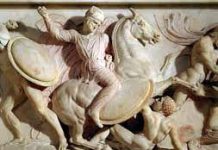Adonis (Ali Ahmad Said Asbar) is an Arab poet, literary critic, and translator, widely considered one of the most influential and innovative thinkers in contemporary Arabic poetry.
Adonis | Ali Ahmad Said Asbar | Brief Biography
Adonis | Ali Ahmad Said Asbar | Brief Biography
Adonis (Ali Ahmad Said Asbar) is an Arab poet, literary critic, and translator, widely considered one of the most influential and innovative thinkers in contemporary Arabic poetry. He was born on 1 January 1930 in the village of Al Qassabin in the coastal region of Latakia, Syria.
Adonis’ literary career spans over several decades, during which he has published numerous collections of poetry and critical works. He is best known for his avant-garde style, which challenges traditional Arabic poetic forms and language, and for his experimental use of themes related to sexuality, death, and cultural identity. He has been described as a visionary poet who has transformed the Arabic literary landscape with his modernist approach.
Adonis’ early works, such as “The Book of the Palace” (1957) and “A Time Between Ashes and Roses” (1959), broke away from conventional Arabic poetry and explored new themes, styles, and forms. He was part of the “Arabian School of Poetry,” which sought to revitalize the Arabic literary tradition and make it relevant to the modern world. In addition to his own writing, Adonis has translated and introduced works by European poets, including Rimbaud, Mallarmé, and Nietzsche, into Arabic, thus introducing new concepts and styles to the Arabic literary canon.
Ali Ahmad Said Asbar‘s critical writings have also had a profound impact on contemporary Arabic literature. In works such as “The Rebellion of Arab Poetry” (1974), “The Release of the Book of Poetry” (1981), and “The Dream of the Poem” (1987), he has analyzed the evolution of Arabic poetry and advocated for its renewal through experimentation and innovation. He has also explored the intersections of literature, culture, and politics, and has written extensively on the role of art and poetry in the Arab world.
Adonis has received numerous awards and honors for his contributions to Arabic literature and culture, including the Sultan bin Ali Al Owais Cultural Award, the Neustadt International Prize for Literature, and the Lannan Foundation Prize for Cultural Freedom. He currently lives in Paris, France, and continues to write and publish new works. 0 0 0
Adonis | Ali Ahmad Said Asbar: Comprehensive Biography
Early Life and Background
- Name: Ali Ahmad Said Asbar
- Pen Name: Adonis
- Date of Birth: January 1, 1930
- Place of Birth: Qassabin, Syria
- Cultural Heritage: Adonis belongs to the Alawite community, and his early exposure to Arabic culture and language significantly influenced his literary journey.
Education
Adonis studied at the University of Damascus, where he developed a passion for literature and poetry. His academic background helped him refine his poetic voice and explore diverse literary forms.
Literary Career
Adonis began publishing poetry in the late 1940s. His work is known for its innovative style and deep philosophical themes. He often incorporates elements of mysticism, politics, and personal experience into his poems.
His first major work, ‘The Songs of Mute Love,” was published in 1957, marking the beginning of his recognition as a significant figure in Arabic poetry.
Contributions to Arabic Literature
Adonis is credited with modernizing Arabic poetry, blending traditional forms with modernist techniques. His poetry often challenges conventional norms and explores the complexities of identity, culture, and existence.
He has published numerous collections, including “The Presence of the Poet,” “The Asphalt River,” and “The Book of the Night.” His work has been translated into several languages, expanding his influence beyond the Arabic-speaking world.
Political and Cultural Engagement
Throughout his career, Adonis has been vocal about political issues in the Arab world, including the impact of war and oppression. His poetry often reflects the socio-political landscape of the region, addressing themes of freedom, exile, and cultural identity.
Awards and Recognition
Adonis has received numerous awards for his contributions to literature, including the Lenin Peace Prize and the Naguib Mahfouz Medal for Literature. His innovative approach has earned him a place among the most celebrated poets of the Arab world.
Later Life and Influence
In the later years of his life, Adonis has continued to write and engage in literary criticism, teaching at various universities around the world. He remains a pivotal figure in contemporary Arabic literature, influencing new generations of poets and writers.
Conclusion
Adonis’s work transcends borders, reflecting the complexities of human experience while pushing the boundaries of poetic form. His contributions to Arabic literature have solidified his reputation as one of the most important literary figures of the 20th and 21st centuries.
Adonis | Ali Ahmad Said Asbar:Facts
Here are some key facts about Adonis (Ali Ahmad Said Asbar):
1. Birth Name: Ali Ahmad Said Asbar.
2. Pen Name: Adonis, derived from the name of the ancient Phoenician god.
3. Date of Birth: January 1, 1930.
4. Place of Birth: Qassabin, a village near Latakia, Syria.
5. Education: Studied philosophy at the University of Damascus.
6. Political Involvement: Arrested for his political activities in Syria in the 1950s.
7. Exile: Moved to Beirut, Lebanon, in 1956 due to political persecution, later settling in Paris, France.
8. Literary Contributions: Known for modernizing Arabic poetry, combining traditional and free verse with themes of mysticism, identity, and politics.
9. Major Works: Some of his notable works include “The Songs of Mihyar the Damascene” (1961), “The Book of the Siege” (1985), and “A Time Between Ashes and Roses” (1970).
10. Awards: Recipient of numerous awards, including the Goethe Prize (2011) and the Arab Novel Award (2011).
11. Influence: Considered one of the most influential poets and literary critics in the Arab world, often compared to Western poets like T.S. Eliot.
12. Languages: His works have been translated into multiple languages, expanding his global influence.
13. Criticism: Adonis has been both celebrated and criticized for his unconventional views on religion, politics, and cultural heritage.
14. Nobel Prize Nomination: Frequently mentioned as a potential Nobel Prize candidate, though he has not won the award.
15. Current Residence: Lives in Paris, France, where he continues to write and lecture.
These facts provide a concise overview of Adonis’s life and contributions to literature.
Sources:
- Adonis: An Introduction, edited by Samah Selim (Syracuse University Press, 2010)
- The Cambridge Companion to Adonis, edited by Nazih Khadduri and J.E. Peterson (Cambridge University Press, 2015)
- Adonis: Selected Poems, translated by Samuel Hazo and Khaled Mattawa (University of California Press, 2004)
- “Adonis: A Critical Introduction,” by Khaled Mattawa in The Oxford Handbook of Modern Arabic Literature (Oxford University Press, 2012).
Adonis | Ali Ahmad Said Asbar | Brief Biography
N. B. This article ‘Adonis’ originally belongs to the book, ‘Brief Biographies of Ancient Thinkers and Writers‘ by Menonim Menonimus.
Books of Biography by M. Menonimus:
- The World Writers-Brief Biographies
- Introduction to World Writers
- Introduction to World Personalities
- Love of Reputed Persons ..
Additional Searches:











